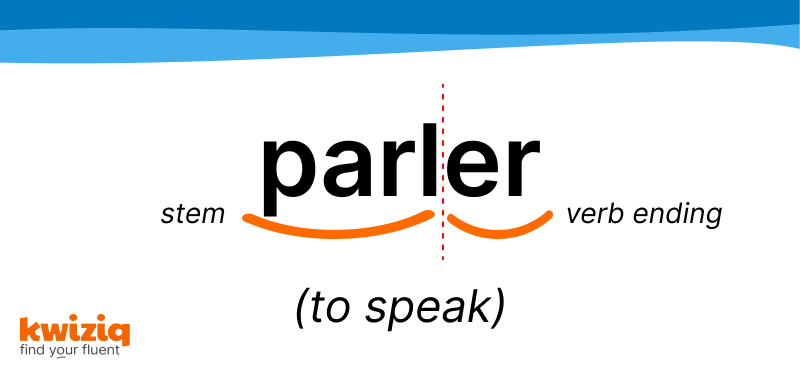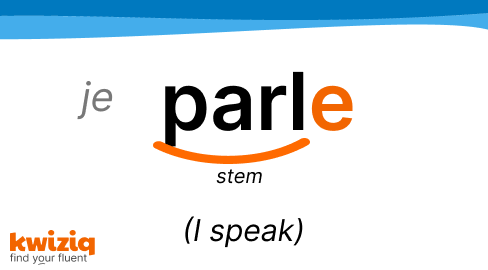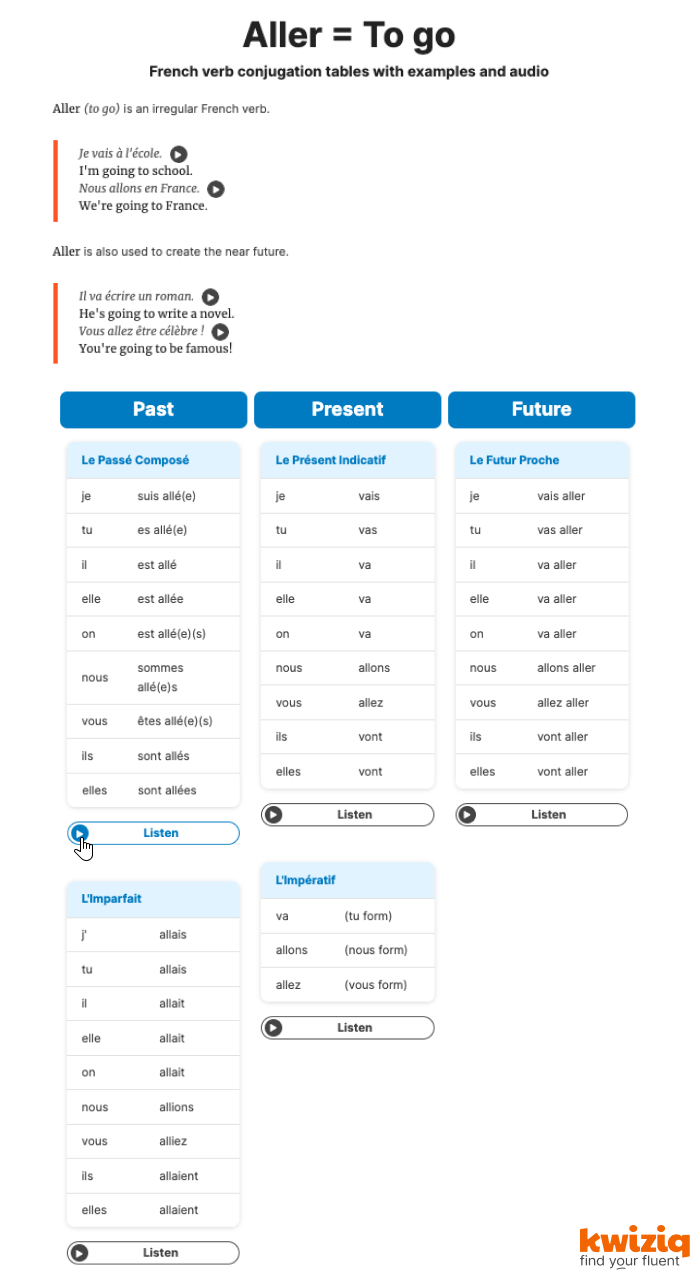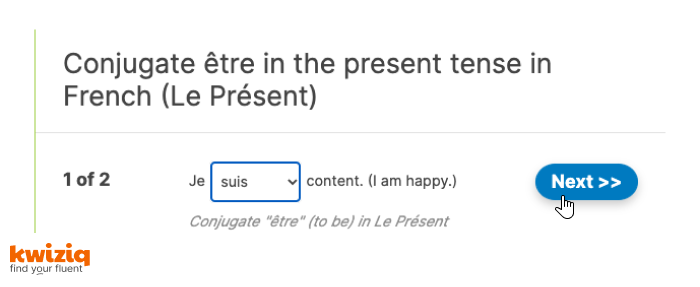
Table of Contents
- Infinitives and Verb Conjugation Groups
- Être and Avoir - Irregular and Indispensable French Verbs
- 3 Ways to Practise French Verb Conjugations
Unless you're planning to emulate Tarzan in your next Language conversation - "me want baguette" - one of your first goals as a Language learner is to be able to accurately conjugate verbs in order to communicate a thought, feeling, or idea effectively (and with nuance!).
To conjugate a verb simply means to change a verb to refer to a different person (or persons), tense or mood for a sentence to have the desired meaning.
By conjugating a Language verb correctly in a sentence, you'll be making sure you are conveying the meaning you actually want. You already do it every day in English, and with a little bit of practice, you can master it in Language too!
It's no secret that Language conjugation is much more complex than English conjugation, and the former's 21 verb forms and multiple rule exceptions definitely make it more challenging to learn. But trust us on this, once you've mastered the most common verbs and how to conjugate regular verbs, learning the rest of the Language conjugation rules will definitely come more easily!
Here, we'll cover the basics of Language conjugation, important rules to remember, and regular and irregular verbs.
We have a comprehensive Language verb conjugation guide that covers both beginner and advanced concepts. If you're looking to understand the full scope of Language verb conjugation, starting there might be your best first step.
Infinitives and Verb Conjugation Groups
To conjugate a Language verb, you need to know the infinitive form of the verb.
What is an infinitive?
An infinitive is the original form of the verb before it is conjugated. In other words, it is the way the verb appears in the dictionary.
Why is the infinitive important?
The infinitive form of a verb is important to know because this is the essential version of the verb, the basic form, and we use it to conjugate the verb in different tenses. Knowing the infinitive form of the verb (and specifically its ending), will indicate which conjugation pattern you need to follow.
How many types of infinitives/conjugation groups are there in Language?
There are 3 official verb conjugation groups in Language, organised according to their infinitive endings
-
1st group: verbs ending in -er (except for aller)
-
2nd group: regular verbs ending in -ir
-
3rd group: all other verbs ending in -dre, -re, -oir, and -ir, plus the verb aller.
To dive deeper into these groups and learn how to master them, check out our How to Learn French Verb Conjugation Groups guide.
For example:
-
parler (to speak) belongs to the 1st conjugation group of verbs in -er
-
finir (to finish) belongs to the 2nd conjugation group of verbs in -ir
-
prendre (to take), faire (to do), savoir (to know) and dormir (to sleep) belong to the 3rd conjugation group of verbs
Each verb conjugation group follows a different pattern for every tense. Here, we'll focus on the present tense.
So to conjugate the verb, you first need to identify the stem and the verb ending. The stem of a verb is what is left when you remove the infinitive ending (-er, -ir, -re, -dre or -oir). When we look at parler again, we see that the stem is parl-.

That's how we know that the verb belongs to the conjugation group -er. The verb ending changes based on who/what the subject of the sentence is; i.e., who/what is acting, as well as the tense the action takes place in.
The corresponding ending for the "je" form in the present tense is added to it: parle (I speak).

Looking specifically at the example of the Language present tense, you can see how the conjugations differ depending on whether you're dealing with an -er, -ir or -dre verb:
- Conjugate regular French -er verbs in the present tense
- Conjugate regular French -ir verbs in the present tense
- Conjugate regular French -dre verbs in the present tense
Être and Avoir - Irregular and Indispensable Language Verbs
In Language, there are two verbs you will absolutely need to master. They are the most important verbs in the language:
- Être (to be)
- Avoir (to have)
If you want to learn how to conjugate être and avoir in all tenses and hear the correct pronunciations of each conjugation, check out our verb tables:
Besides their basic meanings, you will need to learn that avoir and être are also used in many other ways and situations in Language. To help you master these two essential verbs, here's our dedicated page so you can go into much more detail on the difference between être and avoir, when to use each one, and how to practise this specific topic.
3 Ways to Practise Language Verb Conjugations
Now that you have a grasp on the basics of Language verbs, rules and conjugations, it's time to practise!
Whether you are a beginning, intermediate, or advanced Language learner, there is always room for improvement when it comes to verb conjugation. So here are 3 effective ways to practise your Language verb conjugations:
1. Use Language verb conjugation tables
Verb tables are a great way to help you quickly identify which conjugation to use based on the person, tense, and mood. By looking at these tables, you can see how a verb is conjugated in every tense and get a quick explanation of what each tense means and how to use it.
If you are interested in a particular verb, you can see all its conjugations at a glance. This useful learning resource will help you identify the different conjugations of a verb and it will make it easier to see the differences between how to say, for example, "I go," "I went," and "I will go": "je vais," "je suis allé," and "j'irai".
Our Language verb tables also come with audio files, so you can practise your pronunciation as you learn each verb conjugation. Quel doublé gagnant !
So go and explore our Language Verb Conjugation Tables to find every verb you can think of!
2. Study our conjugation-focused lessons
At Kwiziq, we have hundreds of Language lessons for you to progress faster in your learning journey, and many are dedicated specifically to Language verb conjugation rules.
In each lesson, you'll get a brief explanation on how to conjugate verbs in a specific tense, partnered with useful examples and audio files to practise your listening and speaking skills while you're at it. You'll also be able to get to practise what you've learnt straight away with our very special (and user favourite!) microkwizzes, which are quick and simple 2-question kwizzes to test your understanding of that specific lesson.
3. Test your progress with Language fill-in-the-blanks exercises
If you want to test your knowledge, try out our grammar fill-in-the-blanks exercises (and, psst, we also have vocabulary ones!). Some of them are specifically designed to help you gauge your understanding of verb conjugations in different tenses and moods in a way that's convenient and easy to understand.
Our Language fill-in-the-blanks tests allow you to apply your knowledge in a more authentic way, as you get to use your verb conjugations in context with complete texts and dialogues. What better way to progress on your language journey in a meaningful and rewarding way?
Plus, the tests are automatically graded, so you get immediate feedback on your performance. Super, n'est-ce pas?
That's it for now! If you're still reading, congrats! That means you're really committed to your Language verb practice. If you’re ready to dive deeper, check out our Advanced Concepts in Language Verb Conjugation guide, where you’ll learn about tenses, moods, and more complex grammatical structures.
Don't forget you can access our numerous tools and resources to help you master your Language verb conjugation skills by creating your free Kwiziq account!
With your personalised study plan, interactive exercises, and uniquely efficient kwizzes, you'll get targeted practice and be able to track your progress over time. And, with access to our verb tables, you'll have everything you need to master your Language verb conjugation skills.
So why wait? Create your account today and take the first step towards fluency in Language!


